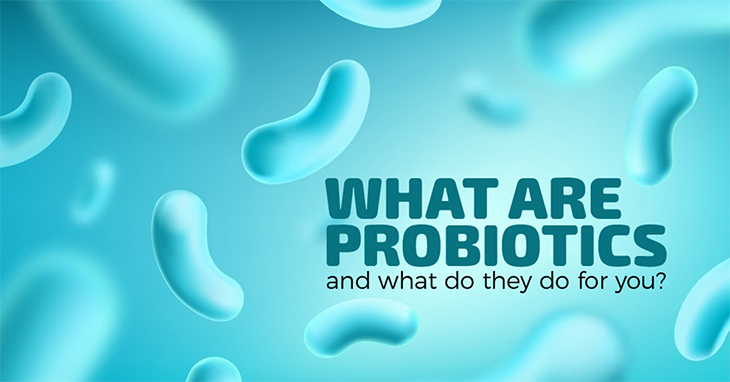What are Probiotics and What Do They Do for You?
Category: Healthy Nutrition

There are trillions of bacteria, fungi, viruses, and other microbes living in your body. Most of these are found in your intestines, collectively known as your gut microbiome.
The gut microbiome plays a crucial role in health and preventing disease.
They help with the digestion of certain foods, synthesize some vitamins, contribute to normal immune function, and produce important chemicals that the body can’t make by itself. Scientists believe there are many additional important roles of the microbiota that are yet to be discovered.
Did you know that about 70-80% of your immune system originates in your gut?
Not surprisingly, the healthier your microbiome is, the healthier you are.
The key to a healthy microbiome is maintaining the balance among the nearly 1,000 different species of bacteria in your gut.
An unhealthy microbiome has been shown to play a role in many chronic diseases, including obesity, heart disease, high blood sugar, high cholesterol, and other disorders.
Probiotics: The Good Bacteria
Although many different types of microbes live inside you, bacteria are the most studied.
You might be surprised to know that you have, in fact, more bacteria in your body than you have cells. While few of these species can cause disease, most of them play an extremely important role in your health.

Probiotics are microorganisms living within the body while contributing positively to the body’s health. These are the good bacteria that you actually want in your system. They can be ingested from various types of foods or in dietary supplements.
The main job of probiotics is to maintain a healthy balance in your body, keeping your body healthy and working well.
They support healthy body systems from your mouth to your gut and beyond.
They can help control harmful microorganisms like germs.
When you are sick, probiotics can counteract bad bacteria and help restore the balance within your body.
Probiotics were first discovered in the early 1900s by a scientist named Metchnikoff.
Probiotic means “for life”.
In 1908 Ilya Ilyich Mechnikov, a Nobel Prize-winning microbiologist, made the connection between the longevity of Bulgarian and Balkan peoples and others, with the consuming of fermented milk of cows, buffaloes, and even reindeer.
After years of research, he proposed that tiny microorganisms were living in the fermented milk, and these were somehow stimulating the immune system.
Science is just now starting to catch up with the massive importance that probiotics have in determining our health, weight, many bodily functions and even our moods.

Studies have shown probiotics to:
• Improve and aid in digestion
• Calm irritable bowel syndrome
• Help heal a leaky gut (intestinal permeability)
• Boost immune system
• Improve brain function
• Counteract inflammation and control the growth of disease-causing bacteria
• Produce vitamins, absorb minerals, and eliminate toxins
• Benefit your mood and mental health
• Normalize your weight
Probiotic colonies work with the body’s internal immune system to organize strategies that prevent toxins and pathogenic microorganisms from harming the body.
The quantity and content of our probiotic populations make the difference between those who are easily sickened and overwhelmed by viral, bacterial, or fungal infections.
Probiotics can also quickly identify harmful bacteria or fungal overgrowths and work directly to eradicate them.
Within the intestines, probiotics attach to and dwell in between the villi and microvilli. This allows them to not only keep pathogenic bacteria from infecting those cells but also to monitor the size of food molecules going to the intestinal wall for absorption.
Probiotics are also called ‘friendly’ because they help us digest food and they secrete beneficial nutritional products. Amazingly, probiotics are also a good source of many essential nutrients.
They can manufacture biotin, thiamin (B1), riboflavin (B2), niacin (B3), pantothenic acid (B5), pyridoxine (B6), cobalamine (B12), folic acid, vitamin A and vitamin K.
Probiotics are also critical to nutrient absorption.
Probiotics also assist in peristalsis which is the rhythmic motion of the digestive tract.
They also produce antifungal substances which counteract the growth of not-so-friendly yeasts.
Probiotics can even create compounds that scavenge free radicals helping with oxidative stress.
If all this wasn’t enough, probiotics are instrumental in slowing cellular degeneration and the diseases associated with it. They also prevent LDL cholesterol from being released back into the bloodstream.
With all our worries about bacteria and cleanliness, it turns out some bacteria are our friends!
Fermented foods have been part of alternative medicine for several thousand years.
Traditional probiotic foods include:
• Sauerkraut
• Pickles
• Kefir, miso, tempeh
• Yogurt
• Kimchi
• Cheese
• Kombucha tea

While some of these foods were cultured for taste or preservation, many were found to have substantial benefits for digestive illness.
Unfortunately, many typical diets don’t include enough fermented foods. In addition, medications and other types of foods can create an imbalance in gut flora. These are just a couple of reasons why it’s recommended to take a probiotic supplement.
There are high-quality, scientifically formulated dietary supplements available and these can be beneficial in helping consumers get additional probiotics into their diet.
Optimizing your digestive flora could be one of your most important disease prevention strategies.
Thanks for reading!
Jerry



Facebook Comments